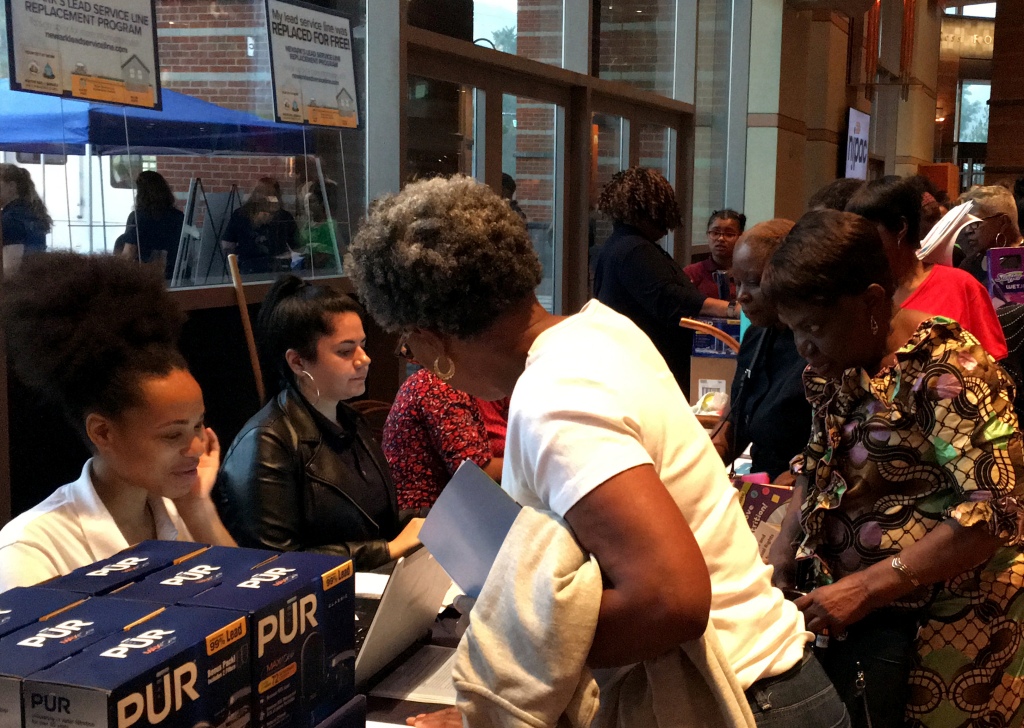Officials insist that lead contamination is under control; residents remain doubtful

In his footed pajamas, three-year-old Bryce Thomas leaned forward on his tippy toes, just managing to see his own reflection in the bathroom mirror. One hand clutched the sink, the other held his toothbrush while his mom handed him a fresh bottle of water to rinse his mouth. For Newark residents like the Thomases, simple tasks like brushing their teeth have become difficult chores.
Newark’s water crisis began 6 years ago when elevated levels of lead were discovered in the city’s water. As a result, the city shut down drinking water in 30 public schools and sent samples to New Jersey’s Department of Environmental Protection for further tests.
Officials discovered that 24 homes tested positive for lead levels above 50 parts per billion between July 2018 and December 2018. During this time, Newark already had violated the federal action level for the fourth time in 2 years.
Newark has gained national attention in the media after Flint, Michigan’s publicized water crisis. Many went to the extent of calling Newark, “the next Flint.” Nearly identical to Flint, Newark has been dealing with lead-contaminated water since 2014. Flint is home to a predominantly black, working class community. Many residents of both cities feel that officials did not convey the gravity of the situation.
Back in October 2019, Newark’s Mayor, Ras Baraka announced that the city would end the distribution of bottled water to Newark residents. Pregnant women and families with children under the age of six can still receive bottled water, citing the effectiveness of the city-issued water filters.
Some residents are reluctant to trust city officials and have been using their own money to purchase water bottles.

Baraka focused much of his speech on demanding that the press leave his city alone. “Talk about me and my family, leave my damn city alone,” said Baraka.
Newark’s Communication Director – Mark Di Ionno says the water problem has been falsely portrayed in the media. The mayor’s office believes that the situation is under control. “It takes time to figure out what the true dangers are,” said Di Ionno.
The danger is concerning for Newark residents as their children are testing positive for lead contamination. A recent study found that 2.5% of kids across the state between six months and 26 months old showed high blood levels in 2017, according to a study by the New Jersey Department of Health. Of that percentage, the highest numbers came from Newark, where 281 children tested between the ages of six months and 26 months showed high levels of lead in their blood.
“It’s scary, I don’t know what the future will bring for my son and the long-term impact this will have on his mental development,” said Thomas who feels like she has failed her son.
Exposure to high levels of lead can cause damage to the brain, blood and kidneys. Children who have been exposed to lead have been shown to have behavior problems: lower IQ, hearing loss, learning abilities, decreased bone and muscle growth, damage to the nervous system, and abnormal function and damage to their kidneys.
“Lead is a highly poisonous metal and can affect almost every organ in the body and the nervous system.”
— Clean Water Action
Adults exposed to lead may experience: memory loss, lack of concentration, headaches, depression, high blood pressure, numbness and pain in the extremities of the nervous system, abnormal kidney function, for males a decreased sex drive and sperm count, and females have suffered with spontaneous miscarriages.
Newark city officials are asking residents to use their water filters properly and be patient. “Don’t run hot water through the filter, don’t use it excessively, and it should last three months. If you do those things, you should be as safe as anyone,” said Di Ionno.
Test results performed by the New Jersey Department of Environmental Protection, and the U.S. EPA show that 97% to 99% of all PUR filters remove lead below the federal action level. The Environmental Protection Agency and other health authorities agree that there is no safe level of lead in water.
Newark will continue to give out PUR water filters and replacement cartridges at three recreation centers across the city: 387 Lyons Avenue, 916 South Orange Avenue, and 201 Bloomfield Avenue. Families with children under six years of age and pregnant women can pick up two cases of bottled water every two weeks – Monday through Friday.

Residents feel like they’re not being supplied with a sufficient amount of clean water. “Two cases of water every two weeks isn’t enough,” said Thomas. “We use it for everything, brushing our teeth, cleaning, cooking.”
In August of 2019, the City of Newark started a Lead Service Replacement Program that will replace nearly 18,000 lead service lines over the next 24 to 30 months. So far, they have replaced 3,723 of the affected lines.
Many residents like Thomas, feel that the city won’t be transparent with them moving forward. As for now, city officials say they are working towards a long term solution and suggest residents to follow all safety precautions.

My name is Cassidy Layton and I am currently a senior at Montclair State University, with plans to graduate this upcoming May. I chose to do a report on the led contamination in Newark water to bring awareness to an important, unnoticed crisis.

Jaydeen DeCambre is a senior at Montclair State University majoring in Communication and Media Arts. She is also a resident of Newark, NJ.

Ashley Cusicanqui is a senior at Montclair State University and is majoring in Television and Digital Media. I chose to report on Newark’s lead water crisis to inform the public about the dangerous and confusing time Newark residents are facing.




